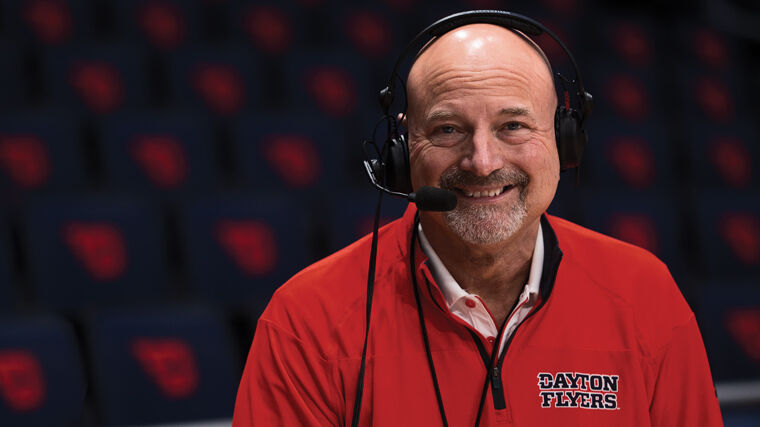Larry Hansgen’s Story: Back Surgery, Then Back To Broadcasting

Premier Health is the official health care provider for the University of Dayton
For the past 40 years, Larry Hansgen has been one of the region’s most popular radio personalities in his dual roles as the voice of the Dayton Flyers and host of WHIO’s morning news program. It seemed that nothing could slow him down – until his back pain became unbearable.
Luckily, Hansgen knew where to seek help: the spine specialists at Premier Health. “I’ve seen what Premier has done for Dayton athletes through the years, so when I needed help, that was the first place I turned,” he says.
Living With Constant Pain
For most of his life, Hansgen has been physically active – running, weightlifting, playing softball and volleyball. As his back pain intensified, however, walking became his main form of exercise. “And then one day it hurt to walk,” he recalls.
The pain affected every aspect of his life – his quality of sleep, the taste of food, even his ability to focus during his fast-paced workday. “I would be OK during the course of the broadcast, and then I’d have to get up out of that chair and oh boy, was that tough,” he says.
Spine surgeon Norah Foster, MD, presented Hansgen with two surgical options: spinal fusion or a decompression procedure. With spinal fusion, two or more vertebrae are fused together so they become one solid bone. Localized decompression surgery, known as a laminectomy, takes away bone, soft tissue, or arthritis with the goal of alleviating pressure on the spinal cord or nerves. Spinal fusion surgery can result in greater stiffness of the spine and more limited range of motion. Knowing that Hansgen is highly active, Dr. Foster wanted to explore a non-fusion option.
“Larry had compression around his nerves, contained within a canal,” explains Dr. Foster, orthopedic spine medical director for Premier Health Spine, a service
of Premier Physician Network. “We take pressure off the nerves by opening up and making the nerves nice and free.”
Communication Is Key
Dr. Foster talked openly with Hansgen about the benefits and risks of both options. After careful consideration, Hansgen opted for the decompression surgery. “The benefits outweighed the risks for me,” he says.
Communication was the key to his decision, Hansgen says. “They listened to me, and that was the most important thing. Nobody looks forward to surgery, but I actually embraced the opportunity to feel better because of everything that had been explained to me.”
Hansgen’s rapid recovery from the successful surgery is due in part to excellent health habits and a high level of motivation, Dr. Foster says. He was back to work 10 days post-surgery, and back on the golf course within six weeks.
“Surgery feels like a long time ago now, but it really was less than a year – what a change,” Hansgen says. “I’m looking forward to another spring out on the golf course. I’m able to walk again, to run a little bit, and even to resume weightlifting. These are things I thought I simply was not going to be able to do again.”
Pay Attention To Symptoms
Neck and back pain can be normal as people age, Dr. Foster says, but patients should be attuned to pain that affects daily living. “When pain radiates from the neck to the arms or from the lower back to the legs, that could be a sign of nerve compression,” she says. Dr. Foster also recommended looking out for spinal cord symptoms, such as dropping objects, sloppy handwriting, and problems with balance and walking.
Hansgen urges anyone experiencing such symptoms to reach out to the spine specialists at Premier Health. “They did a great job for me, and I have confidence in what they can do for others,” he says.


